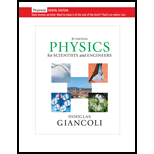
PHYSICS F/SCI.+ENGR.,CHAPTERS 1-37
5th Edition
ISBN: 9780134378060
Author: GIANCOLI
Publisher: RENT PEARS
expand_more
expand_more
format_list_bulleted
Expert Solution & Answer
Want to see the full answer?
Check out a sample textbook solution
Students have asked these similar questions
Hi! I need help with these calculations for part i and part k for a physics Diffraction Lab. We used a slit width 0.4 mm to measure our pattern.
Examine the data and % error values in Data Table 3 where the angular displacement of the simple pendulum decreased but the mass of the pendulum bob and the length of the pendulum remained constant. Describe whether or not your data shows that the period of the pendulum depends on the angular displacement of the pendulum bob, to within a reasonable percent error.
In addition to the anyalysis of the graph, show mathematically that the slope of that line is 2π/√g . Using the slope of your line calculate the value of g and compare it to 9.8.
Chapter 25 Solutions
PHYSICS F/SCI.+ENGR.,CHAPTERS 1-37
Ch. 25.2 - If 1 million electrons per second pass a point in...Ch. 25.2 - Prob. 1BECh. 25.3 - Return to the Chapter-Opening Question, page 651,...Ch. 25.4 - Prob. 1DECh. 25.4 - Prob. 1EECh. 25.4 - Prob. 1FECh. 25.4 - How many 60-W 120-V lightbulbs can operate on a...Ch. 25.6 - Each channel of a stereo receiver is capable of an...Ch. 25 - What quantity is measured by a battery rating...Ch. 25 - When an electric cell is connected to a circuit,...
Ch. 25 - When a flashlight is operated, what is being used...Ch. 25 - One terminal of a car battery is said to be...Ch. 25 - When you turn on a water faucet, the water usually...Ch. 25 - Can a copper wire and an aluminum wire of the same...Ch. 25 - The equation P = V2/R indicates that the power...Ch. 25 - What happens when a lightbulb burns out?Ch. 25 - If the resistance of a small immersion heater (to...Ch. 25 - Prob. 10QCh. 25 - Explain why lightbulbs almost always burn out just...Ch. 25 - Which draws more current, a 100-W lightbulb or a...Ch. 25 - Electric power is transferred over large distances...Ch. 25 - A 15-A fuse blows repeatedly. Why is it dangerous...Ch. 25 - When electric lights are operated on low-frequency...Ch. 25 - Driven by ac power, the same electrons pass back...Ch. 25 - The heating element in a toaster is made of...Ch. 25 - Is current used up in a resistor? Explain.Ch. 25 - Compare the drift velocities and electric currents...Ch. 25 - A voltage V is connected across a wire of length l...Ch. 25 - Why is it more dangerous to turn on an electric...Ch. 25 - Prob. 1PCh. 25 - Prob. 2PCh. 25 - Prob. 3PCh. 25 - Prob. 4PCh. 25 - Prob. 5PCh. 25 - Prob. 6PCh. 25 - Prob. 7PCh. 25 - Prob. 8PCh. 25 - Prob. 9PCh. 25 - Prob. 10PCh. 25 - Prob. 11PCh. 25 - Prob. 12PCh. 25 - Prob. 13PCh. 25 - Prob. 14PCh. 25 - Prob. 15PCh. 25 - (II) A rectangular solid made of carbon has sides...Ch. 25 - (III) A hollow cylindrical resistor with inner...Ch. 25 - Prob. 63GP
Knowledge Booster
Learn more about
Need a deep-dive on the concept behind this application? Look no further. Learn more about this topic, physics and related others by exploring similar questions and additional content below.Similar questions
- An object is placed 24.1 cm to the left of a diverging lens (f = -6.51 cm). A concave mirror (f= 14.8 cm) is placed 30.2 cm to the right of the lens to form an image of the first image formed by the lens. Find the final image distance, measured relative to the mirror. (b) Is the final image real or virtual? (c) Is the final image upright or inverted with respect to the original object?arrow_forwardConcept Simulation 26.4 provides the option of exploring the ray diagram that applies to this problem. The distance between an object and its image formed by a diverging lens is 5.90 cm. The focal length of the lens is -2.60 cm. Find (a) the image distance and (b) the object distance.arrow_forwardPls help ASAParrow_forward
arrow_back_ios
SEE MORE QUESTIONS
arrow_forward_ios
Recommended textbooks for you
 Physics for Scientists and Engineers, Technology ...PhysicsISBN:9781305116399Author:Raymond A. Serway, John W. JewettPublisher:Cengage Learning
Physics for Scientists and Engineers, Technology ...PhysicsISBN:9781305116399Author:Raymond A. Serway, John W. JewettPublisher:Cengage Learning College PhysicsPhysicsISBN:9781285737027Author:Raymond A. Serway, Chris VuillePublisher:Cengage Learning
College PhysicsPhysicsISBN:9781285737027Author:Raymond A. Serway, Chris VuillePublisher:Cengage Learning College PhysicsPhysicsISBN:9781305952300Author:Raymond A. Serway, Chris VuillePublisher:Cengage Learning
College PhysicsPhysicsISBN:9781305952300Author:Raymond A. Serway, Chris VuillePublisher:Cengage Learning
 College PhysicsPhysicsISBN:9781938168000Author:Paul Peter Urone, Roger HinrichsPublisher:OpenStax College
College PhysicsPhysicsISBN:9781938168000Author:Paul Peter Urone, Roger HinrichsPublisher:OpenStax College Principles of Physics: A Calculus-Based TextPhysicsISBN:9781133104261Author:Raymond A. Serway, John W. JewettPublisher:Cengage Learning
Principles of Physics: A Calculus-Based TextPhysicsISBN:9781133104261Author:Raymond A. Serway, John W. JewettPublisher:Cengage Learning

Physics for Scientists and Engineers, Technology ...
Physics
ISBN:9781305116399
Author:Raymond A. Serway, John W. Jewett
Publisher:Cengage Learning

College Physics
Physics
ISBN:9781285737027
Author:Raymond A. Serway, Chris Vuille
Publisher:Cengage Learning

College Physics
Physics
ISBN:9781305952300
Author:Raymond A. Serway, Chris Vuille
Publisher:Cengage Learning


College Physics
Physics
ISBN:9781938168000
Author:Paul Peter Urone, Roger Hinrichs
Publisher:OpenStax College

Principles of Physics: A Calculus-Based Text
Physics
ISBN:9781133104261
Author:Raymond A. Serway, John W. Jewett
Publisher:Cengage Learning
How To Solve Any Resistors In Series and Parallel Combination Circuit Problems in Physics; Author: The Organic Chemistry Tutor;https://www.youtube.com/watch?v=eFlJy0cPbsY;License: Standard YouTube License, CC-BY